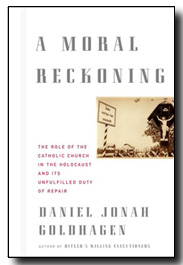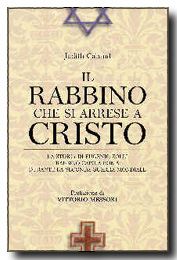Anti-Semitism, Anti-Catholicism and Truth
- DONALD DEMARCO
I approached this essay by reading Daniel Jonah Goldhagen's "A Moral Reckoning: The Role of the Catholic Church in the Holocaust and its Unfulfilled Duty of Repair" (2002) in conjunction with its polar opposite, Eugenio Zolli's "Why I Became a Catholic" (1953).
 |  |
Zolli was the chief rabbi in Rome during the entire Nazi presence in World War II. On his mother's side there had been 130 years of rabbinical tradition. He served as the director of the Israelite Italian Rabbinical College. At his baptism he changed his first name from Israel to Eugenio, taking Pope Pius XII's baptismal name (Eugenio Pacelli). "The power of salvation unto blessedness," he wrote, "is Christianity with faith in Christ." In an earlier work, Antisemitismo, he wrote of "the great charity of the Holy Father and my admiration for him and his work."
The epigraph of Goldhagen's harsh indictment of Christianity, including Pius XII, is a quotation in which that same pope professes his commitment "to give testimony to the truth," one that shall not "be influenced by earthly considerations." Goldhagen finds irony in this remark apparently believing that the Church's lofty concern for truth excluded earthly matters such as the factors leading up to the Holocaust. According to the Church's mind, of course, truth, embodied by Christ, is the ground in which moral commitment is anchored. The truth that all human beings are created in God's own image and have inalienable rights that must be honored and defended is at the heart of Church teaching.
Zolli begins his book by contemplating the crucified Christ over the altar as symbolizing the crucifixion of truth. He pays homage to the person and the charity of Pius XII, "the charity that so often shines in the history of the Church and which radiated fully in the actions of the reigning Pontiff."
Dr. Samuel Nigro has said of Zolli's conversion that "his witness shames all the far removed accusers of 'silence,' 'collaboration' and 'not helping.'"
Christians and historians should both share an unrelenting passion for truth. Goldhagen begins his book by charging Christianity with spreading "throughout its domain a megatherian hatred of one group of people: the Jews."
"This hatred," he goes on to say, "led Christians to commit many grave crimes and other injuries against Jews, including mass murder. The best-known and largest of these mass murders is the Holocaust."
Where is the truth? Does it remain crucified? Christianity no more instigated the Holocaust than does the Church teach that the Jews crucified Christ.
In 1937 Cardinal Eugenio Pacelli (later Pius XII) wrote Pope Pius XI's encyclical Mit Brennender Sorge (With Burning Concern). It was then smuggled into Germany, secretly distributed, and read at Mass on Palm Sunday, March 14, 1937. It condemned racism of any sort: "This God, this sovereign master, has issued commandments whose value is independent of time and space, country and race. As God's sun shines on every human face so his law knows neither privilege nor exception. the Gospel of Jesus Christ admits no substitutes or arbitrary alternatives such as certain leaders pretend to draw from the so-called myth of blood and race."
The encyclical stresses the notions of an "absolute right to profess faith and live according to its dictates," the Good Samaritan, neighbor, and the value of the Old Testament ("Nothing but ignorance and pride could blind one to the treasures hoarded in the Old Testament"). It weighed every word in the "balance of truth and love" not wishing to be guilty of an "untimely silence."
It made obvious references to Hitler as a "prophet of nothingness" and a "superficial mind." Nazis confiscated all available copies of the encyclical, arrested printers who made copies and seized their presses. Hitler himself reacted to the encyclical by announcing his intention to destroy the Church. The Nazi press claimed that Pius XI, who authorized it, "was half-Jewish," and Cardinal Pacelli, who authored it, "was all-Jewish."
The way Goldhagen responds to the encyclical typifies the tone and the tenor of his book. He labels, without any accompanying justifying evidence, both Pius XI and Cardinal Pacelli as "anti-Semites" (p. 141). He dismisses the Church's response to Nazism in general as "kid-glove criticism" (p. 88) and her view of racism in particular as "not inherently pernicious but only that some would have race take precedence over the teachings of Christianity" (p. 46).
Pinchas Lapide was a Jewish rabbi and historian, Israeli Consul General in Milan, and member of the British Eighth Army's Jewish Refugee Committee in Italy from 1943-1945. In his finely researched book, Three Popes and the Jews, he writes: "The Catholic Church, under the pontificate of Pius XII, was instrumental in saving as many as 860,000 Jews from certain death at Nazi hands . . . this achievement stands in startling contrast to the unpardonable foot-dragging and hypocritical lip-service of those outside Hitler's reach."
Toronto's Jewish Standard (July/August 1997) acknowledges how Lapide's careful study "acquits the three popes of charges that they were not deeply concerned with the tragedy of the Holocaust victims."
"As a moral abyss between Hitlerism and the civilized nations widened," the Jewish Standard goes on to note, in quoting Lapide, "no government stood for human rights or common decency none but one." That one, for Lapide, was the Vatican.
There is no mention of Lapide's scholarly study in Goldhagen's book, a rather egregious omission. Nor is there any mention of other solid works that contradict his thesis, such as those written by John Rader and Kataryna Fedoryka, Margherita Marchione, Ben Hecht, Rafael Medoff, Zigmunt Baumann, Michael O'Carroll, Israel Shahak, Virgil Blum and many others. Goldhagen does include several references to Hannah Arendt's Eichmann in Jerusalem but avoids any mention of the many citations in that book describing the extensive cooperation of Jews themselves in the engineering of their own Holocaust. He deals with his opposition as if it did not exist. This is hardly the temper of an honest scholar.
Goldhagen's curt, single-paragraph dismissal of saints Maximilian Kolbe and Edith Stein makes it painfully clear that his approach is both selective and tendentious. This is also made evident by his cavalier stereotypes of the Church as boasting of having a "monopoly on truth" (p. 190) and making "imperious claims that its core doctrines are not subject to criticism" (p. 189). He accuses St. Kolbe of being "the expressly anti-Semitic editor of an anti-Semitic journal" (p. 240).
Why, one may well ask, would the Nazis send a man involved in such overtly "anti-Semitic" activities to his death at Auschwitz? Yet this is just another instance of Goldhagen making an accusation without providing evidence. As we should all know by now, gratuitous accusations without evidence is the classical formula for propaganda. On the other hand, he generously identifies such problematic "Catholic" thinkers as Hans Kung, Johann-Baptist Metz, Roger Haight, James Carroll, John Cornwell and Gary Wills as all being "devout Catholics" (p. 289).
The Yad Vashem Memorial in Israel honors the heroic and extraordinary Catholic involvement in saving Jews during the Holocaust. It also acknowledges that 300,000 non-Jews perished at Auschwitz alone. For Goldhagen, some of these Catholics ("many of them," he writes) "were also anti-Semites." (p. 89). But even the most heroic "acted on their own, in sharp contrast to official Church policy."
At the close of his work, Goldhagen urges the Church to change her "Christian Bible." He also demands monetary reparation for the harm Christians have done to Holocaust victims and their survivors. By contrast, Eugenio Zolli speaks of the millions that the Vatican spent in aiding fugitive Jews to reach safety. He writes: "The New Testament does not abandon the Old. Please help me. As for repayment, I myself shall stand as surety, and since I am poor, the Hebrews of the whole world will contribute to pay the debt" (p. 161). Should Christians repay the Jews, or should Jews repay the Christians? Who is fabricating? Zolli who was there or Goldhagen who was not?
If Goldhagen's book is not hysterical, it surely is unhistorical. Sadly, it provides another unsettling image of truth crucified. Let us return, finally, to Eugenio Zolli: "The Church, through her visible head, offers her love and truth and freedom to all. 'You shall know the truth and the truth shall make you free'" (John 8:32).
 This is Fraser Field, Founder of CERC. I hope you appreciated this piece. We curate these articles especially for believers like you.
This is Fraser Field, Founder of CERC. I hope you appreciated this piece. We curate these articles especially for believers like you.
Please show your appreciation by making a $3 donation. CERC is entirely reader supported.

Acknowledgement
Donald DeMarco. "Anti-Semitism, Anti-Catholicism and Truth." National Catholic Register. (November, 2002).
This article is reprinted with permission from National Catholic Register. All rights reserved. To subscribe to the National Catholic Register call 1-800-421-3230.
The Author




